
Related Stories:
| On August 24, a month before the presidential elections in FR Yugoslavia, Pearl Jam had, a what they said was the last concert in a big city for a while, at Jones Beach, the closest public beach with a decent surf to New York city. At one point, Eddie Veder urged the crowd to take a note of the Rock The Vote tent outside the arena. Rock The Vote is an organization the Serbian Otpor! movement is largely modeled upon. Originating in two countries with a low voter turn-out (both Serbia and the US have less that 40% voter turn-out consistently trough the last decade), both organizations’ program is mainly to register as many people to vote as possibly. Yet, every week, some 30-80 young people from different towns in Serbia get beaten up by the police for belonging to Otpor! (source: Lepa Mladjenovic, Again August in Belgrade), and nobody beats up Rock The Vote activists in the US. On September 4, the BBC reported that police in Belgrade raided Otpor! headquarters seizing most of their belongings. |
 Related Stories: |
Why? Because Otpor! activists are not exactly non-partisan: they clearly have a message against Milosevic, calling their register to vote campaign: "He’s Finished!" Eddie, nudging his audience to register to vote, hesitated to recommend whom to vote for, but was helped by the crowd, that shouted: Ralph Nader, the marginal candidate from the American Green party, that was opposing NATO bombing Yugoslavia and that Boston Globe calls ‘one-note Ralph’ saying that his "message comes down to this: Corporate America has bought and paid for Washington, and it owns us, too." Now, this is a message for which people do get beaten up by the police in the US, as it was evident by the treatment of protesters which are generally gathered around that same message at the Republican National Convention in Philadelphia and, to a lesser extent, at the Democratic National Convention in Los Angeles.
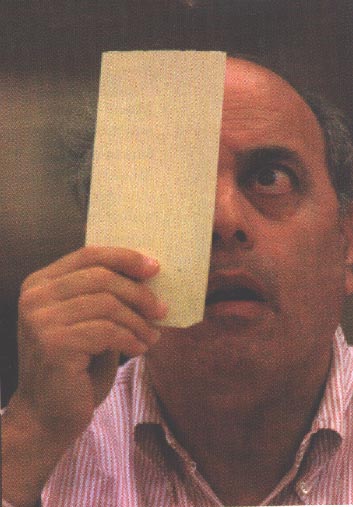 While, belonging to the semantically similar culture like the Otpor! youth, American protesters named their campaign: "The Party’s Over!" - the police in both countries dubbed them "terrorists." They, both, have no partisan political agenda and endorse no particular political candidate, aiming rather at ending the politics as usual in their countries. And, sadly, the fate they face both in Serbia and in the US is quite similar: beatings, arrests, inhumane treatment including humiliation and torture. Unlike Milosevic’s police, which goes around kidnaping political opponents, beating up youth in Otpor! T-shirts, detaining their parents for interrogation, locking up journalists that report about that, withholding newsprint from newspapers or jamming radio signals of stations that they work for and shutting down the offices of local NGO-s that protest such actions, showing no need to pretend adhering to any rules of conduct any more, American Police don’t beat politicians and journalists (yet), but an elderly Quaker CEO of a non-profit organization with a bad knee, Joseph Rogers, did get hog-tied in Philly, and the independent media reporting was prevented in L.A.: police acted civilly, though - they non-violently evacuated the satellite uplink van a minute before the scheduled transmission time - on the pretext of an alleged bomb threat. When Milosevic gave the speech to his supporters in Yugoslav Army military base Berane in Montenegro, Serbian regime press "expanded" the crowd with Photoshop - U.S. media reported similar digital doctoring of a cover for a university's admissions brochure, inserting the face of a black student into a crowd to show greater "diversity" of the student population.
While, belonging to the semantically similar culture like the Otpor! youth, American protesters named their campaign: "The Party’s Over!" - the police in both countries dubbed them "terrorists." They, both, have no partisan political agenda and endorse no particular political candidate, aiming rather at ending the politics as usual in their countries. And, sadly, the fate they face both in Serbia and in the US is quite similar: beatings, arrests, inhumane treatment including humiliation and torture. Unlike Milosevic’s police, which goes around kidnaping political opponents, beating up youth in Otpor! T-shirts, detaining their parents for interrogation, locking up journalists that report about that, withholding newsprint from newspapers or jamming radio signals of stations that they work for and shutting down the offices of local NGO-s that protest such actions, showing no need to pretend adhering to any rules of conduct any more, American Police don’t beat politicians and journalists (yet), but an elderly Quaker CEO of a non-profit organization with a bad knee, Joseph Rogers, did get hog-tied in Philly, and the independent media reporting was prevented in L.A.: police acted civilly, though - they non-violently evacuated the satellite uplink van a minute before the scheduled transmission time - on the pretext of an alleged bomb threat. When Milosevic gave the speech to his supporters in Yugoslav Army military base Berane in Montenegro, Serbian regime press "expanded" the crowd with Photoshop - U.S. media reported similar digital doctoring of a cover for a university's admissions brochure, inserting the face of a black student into a crowd to show greater "diversity" of the student population.
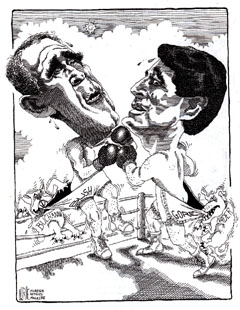 There is this crippling perception, re-enforced by the mainstream media in both countries, that neither Milosevic can loose the Serbian elections nor anybody but either Bush or Gore can win the American ones - it is as if we all have quietly resigned to the fact that those countries are not genuine democracies, and then, this becomes our reality thanks to our complacency. While the Milosevic controlled state TV in Serbia reduced the entire united opposition of 18 parties to one TV slot, the Republican-Democrat controlled Commission on Presidentisl Debates in the U.S. passed the measure that will present only their presidential candidates to the American TV viewer this Fall. The illustrators in both FR Yugoslavia and the U.S. are perceiving the situation in that light: while in Serbian caricature by Corax, Milosevic’s opponents are portrayed as naive fish (with the exception of Draskovic who is given the likeness of cancer) waiting to be caught by Milosevic’s ballot box, in the US caricature by Lurie, the ‘maverick’ political candidates Buchanan and Nader are portrayed as angry dogs (with no human face!) tugging on the underwear of two patrician candidates involved in the noble sport of boxing. Indubitably, Corax’s caricature is correctly depicting the balance of power in Serbia, as Lurie’s is very revealing about the same in the U.S. - what I am focusing on is the basic, perhaps sub-conscious, perception of political situation in which only moneyed elite is taken seriously. That's why I admire Otpor in Serbia and the Mobilization for Global Justice in the US and their daring to say that it is possible for the outcome to be different. Otpor guys say they are going to campaign doors to doors in Serbia urging people to go to elections and vote against Him - so that it becomes impossible for Him to rig the elections. With OSCE monitors banned from Serbia, Milosevic is likely to start the ballots with about half a million votes of people who would not vote in Montenegro, Kosovo and abroad, so opposition will have to beat that lead.
There is this crippling perception, re-enforced by the mainstream media in both countries, that neither Milosevic can loose the Serbian elections nor anybody but either Bush or Gore can win the American ones - it is as if we all have quietly resigned to the fact that those countries are not genuine democracies, and then, this becomes our reality thanks to our complacency. While the Milosevic controlled state TV in Serbia reduced the entire united opposition of 18 parties to one TV slot, the Republican-Democrat controlled Commission on Presidentisl Debates in the U.S. passed the measure that will present only their presidential candidates to the American TV viewer this Fall. The illustrators in both FR Yugoslavia and the U.S. are perceiving the situation in that light: while in Serbian caricature by Corax, Milosevic’s opponents are portrayed as naive fish (with the exception of Draskovic who is given the likeness of cancer) waiting to be caught by Milosevic’s ballot box, in the US caricature by Lurie, the ‘maverick’ political candidates Buchanan and Nader are portrayed as angry dogs (with no human face!) tugging on the underwear of two patrician candidates involved in the noble sport of boxing. Indubitably, Corax’s caricature is correctly depicting the balance of power in Serbia, as Lurie’s is very revealing about the same in the U.S. - what I am focusing on is the basic, perhaps sub-conscious, perception of political situation in which only moneyed elite is taken seriously. That's why I admire Otpor in Serbia and the Mobilization for Global Justice in the US and their daring to say that it is possible for the outcome to be different. Otpor guys say they are going to campaign doors to doors in Serbia urging people to go to elections and vote against Him - so that it becomes impossible for Him to rig the elections. With OSCE monitors banned from Serbia, Milosevic is likely to start the ballots with about half a million votes of people who would not vote in Montenegro, Kosovo and abroad, so opposition will have to beat that lead.
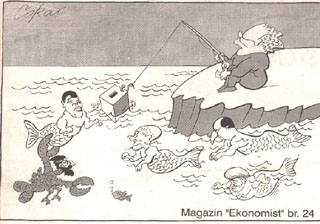 With no capacity for shame, as somebody who lost four wars in five years, Milosevic is running on the platform that "the dominant issue in these elections is the defense of the country and it is clear who supports the defense and who shamefully participates in the aggression against Yugoslavia" (Nikola Sainovic, Yugoslav deputy prime minister, BETA 8/18), describing the elections as a "referendum on the defense of freedom." The message is that if the people show cheerful willingness to vote for the "servants of the new world order" he may be justified to do a military putsch, perhaps, accusing the opposition of election fraud. Always the cynic, he has Yugoslav Army performing military maneuvers near the Kosovo border, dubbed Operation Return 2000. More likely, if he does not succeed in holding onto power through the elections he would do it through yet another Constitutional change - Milosevic may loose the presidential elections, but his party may still win the majority in the Federal Assembly, partially due to the absence of Montenegrin vote, partially due to a split between Vuk Draskovic’s SPO and 18 party united opposition, in which case he may push for yet another change of Constitution to tailor it to his needs: he may have the powers now vested in the function of the country’s federal president transferred to the function of federal prime minister (as it is the situation in most of European democracies) and let himself be elected to that function by ‘his’ Federal Assembly, essentially remaining the holder of absolute power in the country, and in the position to thwart any Djukanovic’s move to secession. Milosevic changes offices (this would be the fourth), but he always makes sure that one he is moving in is vested with the ultimate power.
With no capacity for shame, as somebody who lost four wars in five years, Milosevic is running on the platform that "the dominant issue in these elections is the defense of the country and it is clear who supports the defense and who shamefully participates in the aggression against Yugoslavia" (Nikola Sainovic, Yugoslav deputy prime minister, BETA 8/18), describing the elections as a "referendum on the defense of freedom." The message is that if the people show cheerful willingness to vote for the "servants of the new world order" he may be justified to do a military putsch, perhaps, accusing the opposition of election fraud. Always the cynic, he has Yugoslav Army performing military maneuvers near the Kosovo border, dubbed Operation Return 2000. More likely, if he does not succeed in holding onto power through the elections he would do it through yet another Constitutional change - Milosevic may loose the presidential elections, but his party may still win the majority in the Federal Assembly, partially due to the absence of Montenegrin vote, partially due to a split between Vuk Draskovic’s SPO and 18 party united opposition, in which case he may push for yet another change of Constitution to tailor it to his needs: he may have the powers now vested in the function of the country’s federal president transferred to the function of federal prime minister (as it is the situation in most of European democracies) and let himself be elected to that function by ‘his’ Federal Assembly, essentially remaining the holder of absolute power in the country, and in the position to thwart any Djukanovic’s move to secession. Milosevic changes offices (this would be the fourth), but he always makes sure that one he is moving in is vested with the ultimate power.
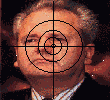 Again, Milosevic skillfully plays his opponents against each other - the Constitutional changes were passed with help of the largest Serbian opposition party, Vuk Draskovic’s SPO, that boycotted the session, and now the united Serbian opposition stands chances to loose the September 24 elections due to the boycott of federal elections by the Montenegrin government of Milo Djukanovic. Draskovic initially wanted to boycott elections, but under the pressure from the rank and file from his party he gave up on that. Still, SPO and United Opposition cannot agree on joint lists of candidates for federal elections, a disagreement that Otpor labeled treasonable. Montenegro, meanwhile, is effectively cut off from the world: to the East border with Albania is blocked, to the North border with Serbia was closed (from Montenegro to Serbia) earlier this summer, to the South Yugoslav Navy is patrolling Montenegrin coast and fighting Montenegro police patrol boats, to the West the border with Croatia was blocked this summer, too - and now, most recently, Yugoslav Army blocked the border with Bosnian Republika Srpska. With changes introduced to the Constitution of FR Yugoslavia on July 6, that reduced Montenegrin legislative participation from 28 to 6 per-cent of Federal Assembly seats, the paranoid, isolationist regime of Slobodan Milosevic showed that it was not satisfied only with dividing multi-ethnic Yugoslavia - it is now proceeding to divide supposedly Serbian lands.
Again, Milosevic skillfully plays his opponents against each other - the Constitutional changes were passed with help of the largest Serbian opposition party, Vuk Draskovic’s SPO, that boycotted the session, and now the united Serbian opposition stands chances to loose the September 24 elections due to the boycott of federal elections by the Montenegrin government of Milo Djukanovic. Draskovic initially wanted to boycott elections, but under the pressure from the rank and file from his party he gave up on that. Still, SPO and United Opposition cannot agree on joint lists of candidates for federal elections, a disagreement that Otpor labeled treasonable. Montenegro, meanwhile, is effectively cut off from the world: to the East border with Albania is blocked, to the North border with Serbia was closed (from Montenegro to Serbia) earlier this summer, to the South Yugoslav Navy is patrolling Montenegrin coast and fighting Montenegro police patrol boats, to the West the border with Croatia was blocked this summer, too - and now, most recently, Yugoslav Army blocked the border with Bosnian Republika Srpska. With changes introduced to the Constitution of FR Yugoslavia on July 6, that reduced Montenegrin legislative participation from 28 to 6 per-cent of Federal Assembly seats, the paranoid, isolationist regime of Slobodan Milosevic showed that it was not satisfied only with dividing multi-ethnic Yugoslavia - it is now proceeding to divide supposedly Serbian lands.
Milosevic’s main opponent, Voijislav Kostunica, representing a coalition of 18 political parties campaigning under the slogan "together" describes the elections in the same terms as a "referendum for or against Slobodan Milosevic." Serb political analysts describe Kostunica like American political analysts describe Al Gore: "Kostunica has many personal qualities as well. He is not power-hungry, not even his biggest enemies accuse him of being corrupt, he is very educated and he writes in a clear language. He is reproached for being dispirited, for not being dynamic enough, for smiling rarely. But these are, nevertheless, all trifles" (Nedeljni Telegraf). His potential voters, tired of him trying to out-Slobo Slobo in Serbian nationalism are distinguished by the act of holding their noses (as if something is stinking badly) if asked whether they’d vote: fortunately, many Serbs would rather vote for a donkey rather than for Milosevic.

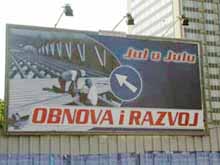 With Otpor seemingly managing to animate sufficient number of people to show up and vote Milosevic out of the office, the regime’s "middle management" is getting increasingly nervous and the pressure on Serbian citizens mount. The bureaucrats are afraid that if they show disloyalty and he wins, they will be sacked badly. They are also afraid that if they remain loyal and he loses, they will be sacked even worse. They all remember the end of Caucescu regime in Romania. In the rapidly worsening economic situation they are ‘borrowing’ the re-built bridges from the U.S. construction companies web sites and downsizing their promises to people who vote for Milosevic from new apartments and free health care to free sugar, flour and oil - increasingly deficient items in modern day Serbia. Concurrently, they are threatening postal employees, police and military officers and employees in the state run companies with loss of their employment should they not agree to put the ballot, with Milosevic's name circled, into the ballot box and return the empty ballot to their supervisors, but, reportedly, with apparent failure of that campaign, the information minister Goran Matic asserted "that the Atlantic alliance has come up with various scenarios, such as infiltrating soldiers wearing Yugoslav Army and police uniforms, to make it possible for the opposition to start civil unrest in the
streets after the election while claiming that the police and the army are
actually on their side (NYT, 9/20)" - trying to pre-empt possible mutiny.The regime is also cutting off railroad lines and gas supplies to municipalities run by the opposition. They are failing at that, too. And, since all public assembly is already banned, they are now pushing police on the soccer stadiums to ‘evacuate’ fans that sing "Go hang yourself, Slobo, save Serbia!" and into coffee shops to search women’s purses for evidence of high treason. Let’s just hope they’ll fail altogether. Meanwhile, we can rest assured that in the U.S. nothing will substantially change: the stability, that capital favors, will prevail, regardless of the outcome of Yugoslav elections, or the U.S. ones for that matter.
With Otpor seemingly managing to animate sufficient number of people to show up and vote Milosevic out of the office, the regime’s "middle management" is getting increasingly nervous and the pressure on Serbian citizens mount. The bureaucrats are afraid that if they show disloyalty and he wins, they will be sacked badly. They are also afraid that if they remain loyal and he loses, they will be sacked even worse. They all remember the end of Caucescu regime in Romania. In the rapidly worsening economic situation they are ‘borrowing’ the re-built bridges from the U.S. construction companies web sites and downsizing their promises to people who vote for Milosevic from new apartments and free health care to free sugar, flour and oil - increasingly deficient items in modern day Serbia. Concurrently, they are threatening postal employees, police and military officers and employees in the state run companies with loss of their employment should they not agree to put the ballot, with Milosevic's name circled, into the ballot box and return the empty ballot to their supervisors, but, reportedly, with apparent failure of that campaign, the information minister Goran Matic asserted "that the Atlantic alliance has come up with various scenarios, such as infiltrating soldiers wearing Yugoslav Army and police uniforms, to make it possible for the opposition to start civil unrest in the
streets after the election while claiming that the police and the army are
actually on their side (NYT, 9/20)" - trying to pre-empt possible mutiny.The regime is also cutting off railroad lines and gas supplies to municipalities run by the opposition. They are failing at that, too. And, since all public assembly is already banned, they are now pushing police on the soccer stadiums to ‘evacuate’ fans that sing "Go hang yourself, Slobo, save Serbia!" and into coffee shops to search women’s purses for evidence of high treason. Let’s just hope they’ll fail altogether. Meanwhile, we can rest assured that in the U.S. nothing will substantially change: the stability, that capital favors, will prevail, regardless of the outcome of Yugoslav elections, or the U.S. ones for that matter.
